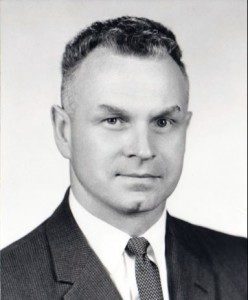Chapter 4, Part 3 – Robert Elliot
Robert Elliot

Robert Elliot
In July 1956, the HRF Board of Trustees appointed Dr. Robert Elliot as president of Western States College. Dr. Elliot, a 1948 graduate of WSC, had served on the Oregon Board of Chiropractic Examiners while maintaining an active practice in Portland. After his appointment, he continued his private practice, which allowed him to dedicate time and attention to the college without financial compensation. His mother, Clara E. Elliot, DC, was also a practicing chiropractic physician in Portland, and his father, Reverend Frederick Elliot, was pastor of a local congregation. Dr. Robert Elliot was often described by others as a “Christian gentleman,” service and dedication to others being hallmarks of his life. He was a beloved friend, admired physician, dedicated educator and a trusted member of the chiropractic profession. The latter attribute would come to serve the college well.
Graduating class June 1956
Graduating class June 1957
Recognizing how rapidly the situation was deteriorating, Dr. Elliot set about addressing the most immediate circumstances undermining the financial stability of the college. By the end of his first month in office, he was able to attract enough in the way of professional contributions to come within five dollars of meeting the mortgage payment for that month. Remarkably, finance records for this period show that by December 1957, the college was operating on an even smaller budget than it had been two years earlier.
Over the next two and a half years, from July 1956 to December 1958, Dr. Elliot generated $22,875 in cash contributions, an unheard of sum of money for that period. Clearly, the chiropractic profession had confidence in and respect for Dr. Elliot. It would be years before the college extricated itself from its financial morass, but the appointment of Dr. Elliot marked the first step in that direction.
Dr. Elliot’s letter to the HRF regarding financial stability
Addressing the college’s seemingly endless cycles of financial instability was not left to Dr. Elliot alone. Dr. Higgens and the other two trustees willingly accepted responsibility to end the constant distraction and drain on human and financial resources. Whenever the college found itself in an insoluble financial crisis, Dr. Higgens would simply “loan” the college money. If the crisis progressed from critical to terminal, the other two trustees would contribute as well.
Dr. Higgen’s letter to FACE regarding direct financial support from HRF trustees
Accepting that an endless cycle of personal giving could not be sustained, the trustees decided it was in their best interests, as well as the college’s, to find a more suitable solution. To that end, the Health Research Foundation reconfigured itself. In addition to the three trustees in whom final authority continued to reside, the trustees elected five “Governors” as advisory members. Additionally, the HRF appointed: “Founders” (contributors of $500 or more annually), “Fellows” (contributors of less than $500 annually), “Associate Members” (contributors of $10 annually), and “Lay Members” (non-chiropractors or groups contributing any amount). It was hoped that with a larger base from which to draw financial support, future crisis could be avoided.
